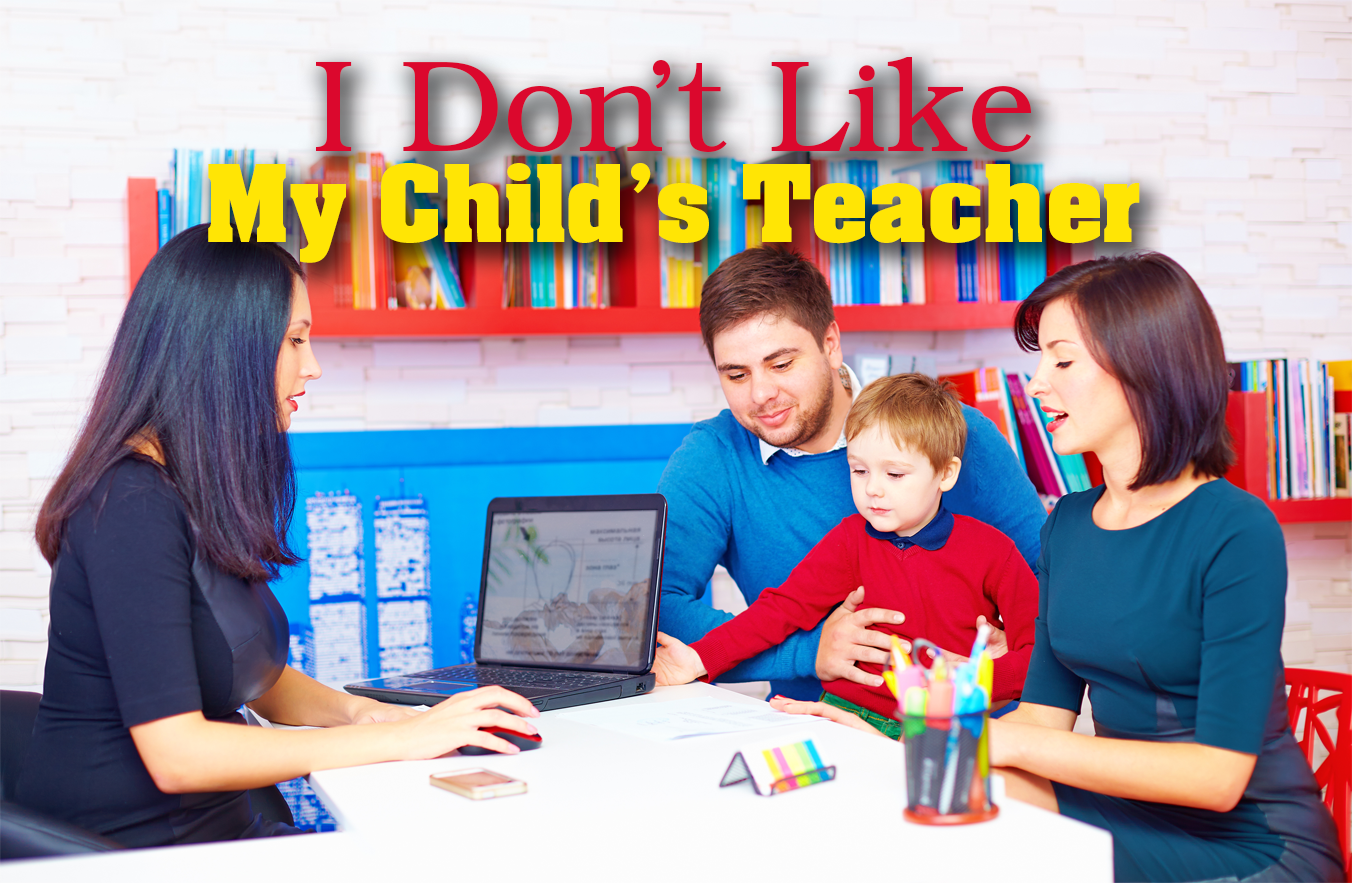School is in full swing and hopefully your child has settled into a routine that keeps things running smoothly. Everything is going well, but there’s something that’s just bothering you. You can’t really put your finger on it. You wind up saying to yourself “I just don’t like my child’s teacher.” She’s nothing like the teacher your child had last year. You don’t feel welcomed in the classroom and you feel she isn’t approachable. So now what?
First and foremost you need to figure out what you don’t like about the teacher. Is this just a clash of personalities or is the teachers demeanor and or teaching style affecting your child adversely? The biggest question that needs to be answered is how does you child feel about it?
If you’re having some apprehension about your child’s new teacher there’s a few steps you can take to make yourself understand the situation better. These steps and questions will help you understand if that voice that saying “I don’t like my child’s teacher” were the wrong first impression or it’s time to move to another classroom.
Arrange a Visit to the Classroom
Few things in this world can tell you more about any situation than looking at it yourself. Contact the school office or director and arrange a visit to the classroom. Don’t take no for an answer. If visits to the classroom are not allowed you are in the wrong school. While you’re there be sure to pay attention to the whole classroom and answer these questions.
- Classroom Management: How do you feel when you walk into the classroom? Are all the children happy and engaged in activities? Are children playing in small groups or independently? Are there children wondering around the room looking for something to do?
- Classroom Organization: Is the classroom orderly? Look around the room. Are the toys and games in bins or cubbies? Are the children’s artwork and projects displayed in an orderly manner. Are there things stacked in corners on the floor without purpose? When a room is not ordered it can create an unsuitable environment for a preschool classroom. Children do not do well with chaos.
- Routines and Rituals: Does the teacher have a daily routine she follows with the students? Do you notice a schedule displayed on the wall? Does the teacher follow the schedule within reason? We all do better when we know what to expect, but please remember a teacher needs to be somewhat flexible depending on the pulse of the class any given day.
- Standard Operating Procedure: Do you feel that this is how the classroom runs daily or is this an epic performance just for you? When a parent walks into a classroom to observe, the teacher is going to be on her toes. Watch her interaction with the children. It will give you a clearer picture of how the classroom is normally handled without you there.
Be honest with yourself and evaluate your observations. Make a list of your observations and discuss them with your partner then make a decision on facts not emotions.
Keep Your Comments to Yourself
- Don’t stir the pot. Talking to other parents is not a good idea. Voice your opinion with the teacher. Be honest and tell her how you feel. Be respectful and listen to what she has to say. Don’t wait until you are at the point that you want to strangle her. Try to clear the air as soon as possible.
- Children have big ears. Talking negatively about a teacher may get repeated to another child or even the teacher. Circle time is primetime for sharing classroom news. You certainly don’t want to be the headliner that day!
- Planting the seed of negativity in your child is a big NO! Be positive to a fault, don’t let your child know you have concerns about his teacher. If the decision is to move your child to a different class come up with a very positive reason why. Keep your child away from the drama, it serves no purpose.
The Next Step
You’ve observed your child’s classroom and had discussions with the teacher. There’s something that’s still off though. You still just don’t like your child’s teacher. If you feel after taking an honest evaluation at what you saw, your child needs to change classrooms it’s time to discuss your options.
- Call the school office and set up an appointment with the director as soon as possible. The receptionist will ask what the appointment is about. Directors don’t like being ambushed, so state your concern as simply as possible. “I would like to discuss my child’s teacher”. Say no more or no less in a calm, clear and respectful way.
- When you sit down with the director voice your concerns. Try not to be emotional. State the facts as simply as possible.
- Discuss your evaluation of the classroom and teacher. Here is where your evaluation notes will help you stay on track. Don’t get long winded. Use words like “what I observed”, ” I could see that…”. Talk about what you saw not how you felt.
- Be reasonable with your expectations. What are you asking the director to do? Listen to what the director has to say before jumping to conclusions.
- If you are asking the director to move your child to another classroom will your child be happy about the change?Make sure this is about your child and not you. You know the saying “If my child is happy then I am happy.”
We like people because they make us feel good about ourselves and the bottom line is life is chemistry. Sometimes teachers are so busy with their young students they don’t have time to play nice with the parents. On the other hand there is such a thing as a bad teacher. You need to put all the pieces of the puzzle together and figure out the best move for your child. Put your ego in a box. Change the idea in your head from “I don’t like my child’s teacher” to “is this teacher the right fit for my child?” It’s not about you, it’s what is best for your child.

 7 Steps to Get Your Child on a School Sleeping Schedule Now
7 Steps to Get Your Child on a School Sleeping Schedule Now Use Role Playing To Relieve School Anxieties In Your Child
Use Role Playing To Relieve School Anxieties In Your Child Don’t Just Skip A Grade Because They Say You Can: Part 2
Don’t Just Skip A Grade Because They Say You Can: Part 2 Don’t Skip a Grade Just Because They Say You Can
Don’t Skip a Grade Just Because They Say You Can Teach Gratitude Through Journaling
Teach Gratitude Through Journaling